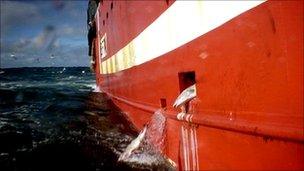EU Council agrees to end fish discards
- Published

The UK government says it would have preferred firmer dates to have been set by the council
Fisheries ministers say Europe should ban the controversial policy of discarding dead fish caught by accident under the EU quota system.
After 24 hours of negotiations, the <link> <caption>EU Council agreed that the procedure should be stopped</caption> <url href="http://www.consilium.europa.eu/uedocs/cms_data/docs/pressdata/en/agricult/130884.pdf" platform="highweb"/> </link> .
Ministers are calling it a breakthrough but environmentalists accuse them of failing to protect the oceans.
Provisional dates agreed by ministers would see a ban on discards of mackerel and herring before 2014.
A phased ban on discards of cod, haddock, plaice and sole would be fully in operation before 2018.
It is more difficult for fishing crews to avoid by-catch with these species which swim together.
The deal is a compromise and subject to more talks. Any final settlement will have to be passed by the parliament and the commission.
The ministers also said that regions of the EU should be given more control over fisheries policy.
And they agreed that overfishing should end by 2015 where possible when scientific advice on the stocks are available, and by 2020 at the latest. Fisheries will be governed on the principle of Maximum Sustainable Yield (MSY).
This was subject to heated discussion, and Greenpeace says the compromise on the timetable is unacceptable.
Green groups will also be sceptical about the wording of the proposed limits to be imposed on fishing crews.
The council's statement, for instance, says long-term agreements should set "quantifiable targets linked to biological parameters".
Environmentalists want targets governed by science, not linked to it.
Greenpeace Oceans Campaigner Willie Mackenzie said: "After decades of bad fisheries management that has devastated fish stocks, EU ministers are failing on their promise to overhaul Europe's fisheries management.
"What happened overnight proves a stubborn resistance to change tack, and leaves EU fisheries reform hanging in the balance. Timelines are vague and too long term, the text on key issues like MSY is incredibly weak, and there is a real risk that fish and fishermen are facing another 10 years of overfishing and stock decline, with real consequences for species like cod, hake and tuna.
"The European Parliament must now step in and make ministers come to their senses."
Celebrity pressure
Green MEP Isabelle Lovin said ministers were being reckless with fish stocks.
"In effect, this is prescribing the continuation of a fisheries industry based on overfishing and resulting unprofitability," she said.
"This will not only drive fish stocks closer to the brink, it will prevent the fishing industry from ever becoming independent of subsidies.
"To add insult to injury, the ministers decided to weaken an already timid proposal from the commission aimed at addressing the wasteful practice of discards.
"They want to adopt a gradual, case-by-case approach to discards, while increasing catch quotas to include fish that are discarded under the current system."
But a UK government spokesman described the provisional deal as a massive step forward. Richard Benyon MP, UK Fisheries Minister, said: "It was always my aim to get the council to agree to end this wasteful practice as soon as possible. While I am disappointed that the council has not agreed the firm dates that I was seeking, a commitment to eliminating discards is a step in the right direction.
"I came to Luxembourg to achieve fundamental reform of the Common Fisheries Policy, to achieve healthy fish stocks, a prosperous fishing industry and a healthy marine environment. There is still a lot more work that needs to be
done but I believe the agreement we have reached is an important step on the way to achieving that."
As reform of the Common Fisheries Policy needs to be agreed by the parliament, it is unlikely that any changes will be agreed before the end of this year.
What the EU Council has done in agreeing a "general approach" to common fisheries reform is to send a clear signal on how they want to proceed.
It follows a long and influential campaign by, among others, the British TV chef and broadcaster Hugh Fearnley-Whittingstall.
- Published13 June 2012
- Published1 March 2011
- Published1 March 2011
- Published1 February 2011
- Published16 January 2011